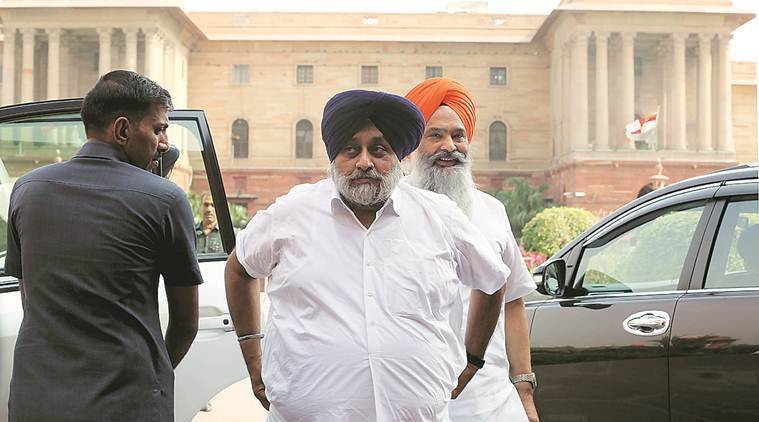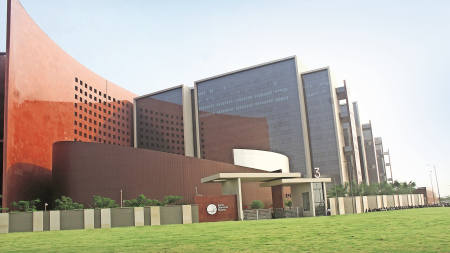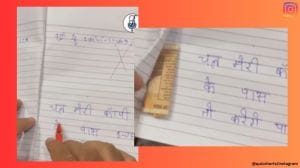- India
- International
Commission of Inquiry member can invoke Section 10-A only during tenure, says Punjab and Haryana HC
Section 10A of the Act gives a High Court the power to sentence a person to six months imprisonment or impose fine upon him or both for "acts calculated to bring the Commission or any member thereof into disrepute" after a complaint is made by a member or an officer authorised by the Commission on its behalf.
 SAD president Sukhbir Singh Badal. (Express Photo by Renuka Puri)
SAD president Sukhbir Singh Badal. (Express Photo by Renuka Puri)
Punjab and Haryana High Court while dismissing the complaint filed by the retired judge Ranjit Singh against Shiromani Akali Dal President Sukhbir Singh Badal and party leader Bikram Singh Majithia has said that Ranjit Singh, who headed the Commission of Inquiry asked by Captain Amarinder Singh-led government to probe the desecration of religious texts in Punjab, could not have filed the complaint under the Commissions of Inquiry Act after its tenure was over.
“Period of six months cannot be enlarged after the complainant ceased to be a member or a Chairman of the Commission. If such interpretation is stretched … then every member of the Commission at his own sweet will can bring the action from the date of alleged commission of the offence de hor of the fact that he no longer remains the Chairman of the Commission. That would tantamount to laying an incorrect law,” Justice Amit Rawal said in an order made public on Sunday.
Section 10A of the Act gives a High Court the power to sentence a person to six months imprisonment or impose fine upon him or both for “acts calculated to bring the Commission or any member thereof into disrepute” after a complaint is made by a member or an officer authorised by the Commission on its behalf. No High Court can take cognizance of the offence unless the complaint has been made within six months of the offence. An appeal against the High Court decision can be filed within 30 days before the Supreme Court.
Justice (retd.) Ranjit Singh headed the inquiry commission between April 2017 and August 31, 2018 and was the Chairman of the one-member panel. As per the complaint filed under the Act directly before High Court in February this year, Badal and Majithia brought disrepute to the Commission through the alleged statements made before media on August 23 and August 27 in 2018. On August 23 last year, Badal held a press conference in Amritsar insinuating that Ranjit Singh had no legal qualification and he also alleged that he had fabricated the documents including witness statements in preparation of the Commission report. On August 27, the Shiromani Akali Dal leaders, including Majithia, mocked the report in a demonstration held outside the Assembly and staged the report’s mock sale while shouting it was available at Rs five in the market. The two incidents have been cited as evidence in the compliant.
Observing that the complaint would have a force if it had been filed before August 31, the Court has said that a simple reading of the provisions “leaves no manner of doubt” that the provisions of Section 10-A can only be invoked by the Chairman or any other member during tenure and not thereafter. It had been argued that the Act doesn’t distinguish between an existing member or whose tenure has ended but only limits the deadline for submitting the complaint to six months.

“Had, the Legislature intended to grant such protection, i.e., liberty to avail the remedy as provided under Section 10-A, there would have been a specific provision,” reads the order, adding “The doctrine akin to rule of interpretation is no longer res integra and equally so, time and again it has been held that when the language of the provisions and the intent of the Legislature do not require any interpretation than the one prescribed, the court cannot re-write the law as it would defeat the purpose of incorporating the provision while enacting an act”.
The Court has also observed that Commissions under the Act are not like a body exercising judicial powers. Rejecting the argument that the Court had already taken a cognizance in the matter after issuance of notice and admitting Badal and Majithia on bail, the Court further said, “High Court in this case as per provision of Section 10-A is empowered to discharge the accused at any previous stage”.
Apr 16: Latest News
- 01
- 02
- 03
- 04
- 05






































